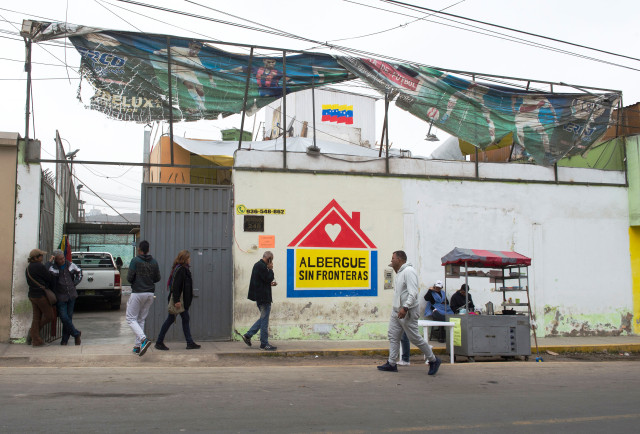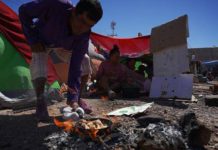
Septiembre 01, 2018.- Katerin Lara vive hacinada en una casa compartida por 200 migrantes venezolanos en un humilde barrio de Lima, donde debe hacer fila para entrar al baño o lavar su ropa, pero se siente afortunada.
“Literalmente le doy gracias a Dios que llegué aquí”, dice a la AFP esta mujer de 24 años sentada en la cama inferior de una de las 40 literas que tiene la casa.
“Escogí Perú porque hay más posibilidad para trabajar si consigues legalizarte. En Colombia te ayudan, pero no hay empleo”, dice Lara, quien permanece con su hija de 6 años desde hace 20 días en este albergue, abierto por un empresario peruano que vivió la dura experiencia de ser migrante en Japón y Corea del Sur en la década de 1990.

A year ago Peruvian textile entrepreneur Rene Cobena started to help eight Venezuelan migrants, offering them one meal a day and a bunk. Now the house he rented, turned into a shelter, housing 200 people, including 30 children, who thanks to donations and Cobena’s good will have a support to start from scratch. / AFP PHOTO / CRIS BOURONCLE

A year ago Peruvian textile entrepreneur Rene Cobena started to help eight Venezuelan migrants, offering them one meal a day and a bunk. Now the house he rented, turned into a shelter, housing 200 people, including 30 children, who thanks to donations and Cobena’s good will have a support to start from scratch. / AFP PHOTO / CRIS BOURONCLE
Tres bebés han nacido en este inmueble de dos pisos de la calle Los Olmos del populoso distrito limeño de San Juan de Lurigancho, y fueron atendidos en un hospital público cercano.
La casa de 200 metros cuadrados, en la que permanentemente se escucha salsa o música llanera, fue alquilada y puesta gratuitamente al servicio de los migrantes venezolanos por el empresario textil René Cobeña.
“Somos como una gran familia”, dice a la AFP Cobeña, de 51 años, casado y padre de dos hijos.
“Al albergue le puse ‘Sin Fronteras’ porque el hambre y la necesidad no tienen bandera”, agrega.
De a dos o tres por cama
Hace un año, René Cobeña empezó a ayudar ocho migrantes venezolanos en una casa alquilada, que ahora, convertida en albergue, ocupan 200 personas, incluidos 30 niños. Por ella han pasado 1.700 personas que huyeron de la crisis en Venezuela.
La casa, en cuya fachada fue pintada una bandera venezolana, tiene tres habitaciones, dos baños, una cocina, una sala y un patio con toldo.
Como las 40 literas no dan abasto, decenas duermen sobre colchonetas en el suelo, incluso en el patio.

A year ago Peruvian textile entrepreneur Rene Cobena started to help eight Venezuelan migrants, offering them one meal a day and a bunk. Now the house he rented, turned into a shelter, housing 200 people, including 30 children, who thanks to donations and Cobena’s good will have a support to start from scratch. / AFP PHOTO / CRIS BOURONCLE

A year ago Peruvian textile entrepreneur Rene Cobena started to help eight Venezuelan migrants, offering them one meal a day and a bunk. Now the house he rented, turned into a shelter, housing 200 people, including 30 children, who thanks to donations and Cobena’s good will have a support to start from scratch. / AFP PHOTO / CRIS BOURONCLE
“Acá los acomodamos, antes dormía uno por cada colchón. Ahora duermen dos o más” personas en uno, explica Cobeña, afirmando que siempre hay espacio para recibir a un venezolano más. De hecho, “todos los días” llega uno nuevo.
“No se les cobra un centavo por esta aquí. Lo único que es les pide es colaboración con la limpieza”, indica el samaritano.
Cobeña estableció un reglamento, que prohíbe fumar, beber alcohol o pelear, y fija una permanencia máxima de un mes.
A su llegada a cada uno se le hace una entrevista, le sacan copia de su documento de identidad y le dan un ejemplar del reglamento.

A year ago Peruvian textile entrepreneur Rene Cobena started to help eight Venezuelan migrants, offering them one meal a day and a bunk. Now the house he rented, turned into a shelter, housing 200 people, including 30 children, who thanks to donations and Cobena’s good will have a support to start from scratch. / AFP PHOTO / CRIS BOURONCLE

A year ago Peruvian textile entrepreneur Rene Cobena started to help eight Venezuelan migrants, offering them one meal a day and a bunk. Now the house he rented, turned into a shelter, housing 200 people, including 30 children, who thanks to donations and Cobena’s good will have a support to start from scratch. / AFP PHOTO / CRIS BOURONCLE
La demanda aumentó después de que el gobierno peruano anunció hace dos semanas que exigiría pasaporte a los venezolanos, cuenta Mauricio Duque, quien funge de administrador y médico del albergue sin percibir salario, tras dejar la carrera de medicina en Venezuela.
Los dos baños de la casa se han hecho insuficientes, por lo que hombres y mujeres deben hacer fila. También hay turnos para lavar la ropa en una máquina eléctrica comprada a crédito por Cobeña.

A year ago Peruvian textile entrepreneur Rene Cobena started to help eight Venezuelan migrants, offering them one meal a day and a bunk. Now the house he rented, turned into a shelter, housing 200 people, including 30 children, who thanks to donations and Cobena’s good will have a support to start from scratch. / AFP PHOTO / CRIS BOURONCLE
“Todo trabajo es digno”
Muchos migrantes salen a ganarse la vida en toda clase de oficios, de manera formal o informal.
Al principio, Cobeña les daba un plato de comida al día, pero gracias a donaciones de amigos, empresarios y peruanos emigrados, ahora les brinda desayuno, almuerzo y cena. El menú de este viernes fue carne guisada con arroz.
El cocinero es el venezolano Brean Villegas, de 22 años, a quien lo tiene sin cuidado el llamado del presidente Nicolás Maduro para que los emigrados dejen de lavar “pocetas” (retretes) y vuelvan a Venezuela.

A year ago Peruvian textile entrepreneur Rene Cobena started to help eight Venezuelan migrants, offering them one meal a day and a bunk. Now the house he rented, turned into a shelter, housing 200 people, including 30 children, who thanks to donations and Cobena’s good will have a support to start from scratch. / AFP PHOTO / CRIS BOURONCLE

A year ago Peruvian textile entrepreneur Rene Cobena started to help eight Venezuelan migrants, offering them one meal a day and a bunk. Now the house he rented, turned into a shelter, housing 200 people, including 30 children, who thanks to donations and Cobena’s good will have a support to start from scratch. / AFP PHOTO / CRIS BOURONCLE
“Todo trabajo es digno. Lo malo sería estar robando. Si se da la oportunidad de lavar pocetas, lo haría”, expresa a la AFP.
El empresario Cobeña, que no recibe apoyo del gobierno ni de organizaciones privadas, acaba de pedir ayuda a la agencia de la ONU para los refugiados, pero mantendrá el albergue aunque no la consiga.
“Les voy a dar la mano hasta donde se pueda”, dice.
“Sin Fronteras” alberga 200 migrantes venezolanos en Lima (Fotos)










